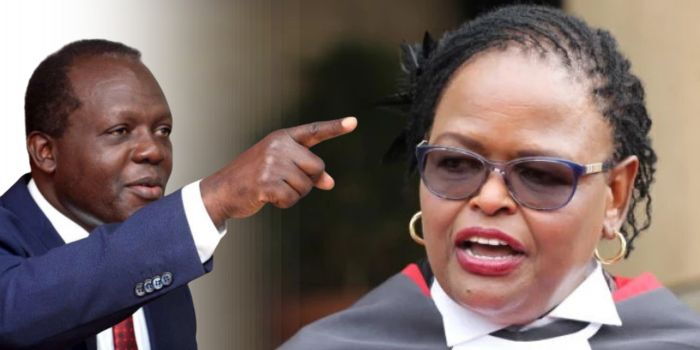Former Cabinet Secretary Raphael Tuju has once again voiced serious concerns about Kenya’s Supreme Court, this time through a strongly worded open letter to Chief Justice Martha Koome. In what marks his third letter to the CJ,
Tuju criticizes five Supreme Court judges for what he calls “outrageous rulings” in his legal battle with the East African Development Bank (EADB) over a 27-acre piece of land in Karen, Nairobi.
Dated March 21, 2025, the letter accuses the Supreme Court judges of handling his case unfairly, setting a dangerous precedent in the judiciary.
Tuju likens the current situation in Kenya’s justice system to the infamous 1857 US Supreme Court ruling in the Dred Scott case, which upheld slavery and played a role in sparking the American Civil War.
He warns that a judiciary that fails to act responsibly can have dire consequences for a fragile nation like Kenya, which he describes as more of a “geographical phenomenon” than a truly unified state.
Concerns Over Supreme Court’s Conduct
Tuju takes issue with the Supreme Court’s rulings, particularly in the 2022 presidential petition, where the judges dismissed claims using phrases like “hot air” and “wild goose chase.”
He argues that such language was reckless and only served to heighten political tensions in an already divided country.
His frustration with the judiciary escalated in October 2024 when five Supreme Court judges—Deputy Chief Justice Philomena Mwilu, Justices Mohammed Ibrahim, Smokin Wanjala, Njoki Ndung’u, and William Ouko—recused themselves from hearing his appeal against a Ksh4.5 billion debt he allegedly owes to EADB.
The judges stepped aside after Tuju accused them of bias and lacking impartiality. In response, they stated that their involvement would not serve justice, but Tuju sees this as a strategic move rather than an act of fairness.
Accusations of Bias and Violating Court Procedures
In his letter, Tuju alleges that the judges have repeatedly denied him fair treatment in court. He claims that they have violated legal procedures, refused to grant him his constitutional right to a rejoinder, and dismissed his evidence without justification.
One of his major grievances is the court’s ruling that his property could be auctioned off, with the possibility of compensation if he later won the case.
Tuju calls this decision immoral and unprecedented, arguing that the law should be based on morality rather than the other way around. “The law cannot be the foundation of morality,” he writes. “Morality is the foundation of good law.”
Judicial Service Commission (JSC) at the Center of the Dispute
Tuju also criticizes the Supreme Court judges for allegedly trying to undermine the Judicial Service Commission (JSC), which is responsible for overseeing the judiciary.
He accuses them of attempting to block JSC proceedings where he has filed complaints against them.
Additionally, he questions their decision to recuse themselves from his case, arguing that it was unnecessary. He claims that the case had already collapsed because a key affidavit had been withdrawn.
“They did not need to recuse themselves,” Tuju states in his letter. “The case was already dead since the affidavit before them had been recanted. Their ‘clever’ decision to recuse themselves was just a cover-up.”
Warnings About Kenya’s Stability
Beyond his personal legal battle, Tuju expresses broader concerns about the state of Kenya’s judiciary and its impact on national stability.
He warns that Kenya is at risk of becoming a failed state, drawing parallels to neighboring countries like Somalia, South Sudan, and the Democratic Republic of the Congo, where weak institutions have led to chaos.
Tuju argues that while Kenya might be able to survive a dysfunctional executive or legislature, a judiciary that lacks accountability is far more dangerous.
He points out that judges enjoy security of tenure, making it difficult to hold them accountable for their decisions.
If the judiciary continues to act irresponsibly, he warns, the consequences for Kenya could be severe.
A Call for Action
In closing, Tuju appeals to Chief Justice Koome, urging her to take a firm stand against judicial misconduct.
He expresses hope that she will have the courage to address these issues and restore public confidence in the Supreme Court. “Your leadership will be judged by how you handle this crisis,” he writes.
Tuju’s latest letter adds fuel to an already heated debate about the role of Kenya’s judiciary and its impact on the country’s governance. Whether Chief Justice Koome will respond or take action remains to be seen.
Join Gen z and millennials TaskForce official 2025 WhatsApp Channel To Stay Updated On time the ongoing situation https://whatsapp.com/channel/0029VaWT5gSGufImU8R0DO30


